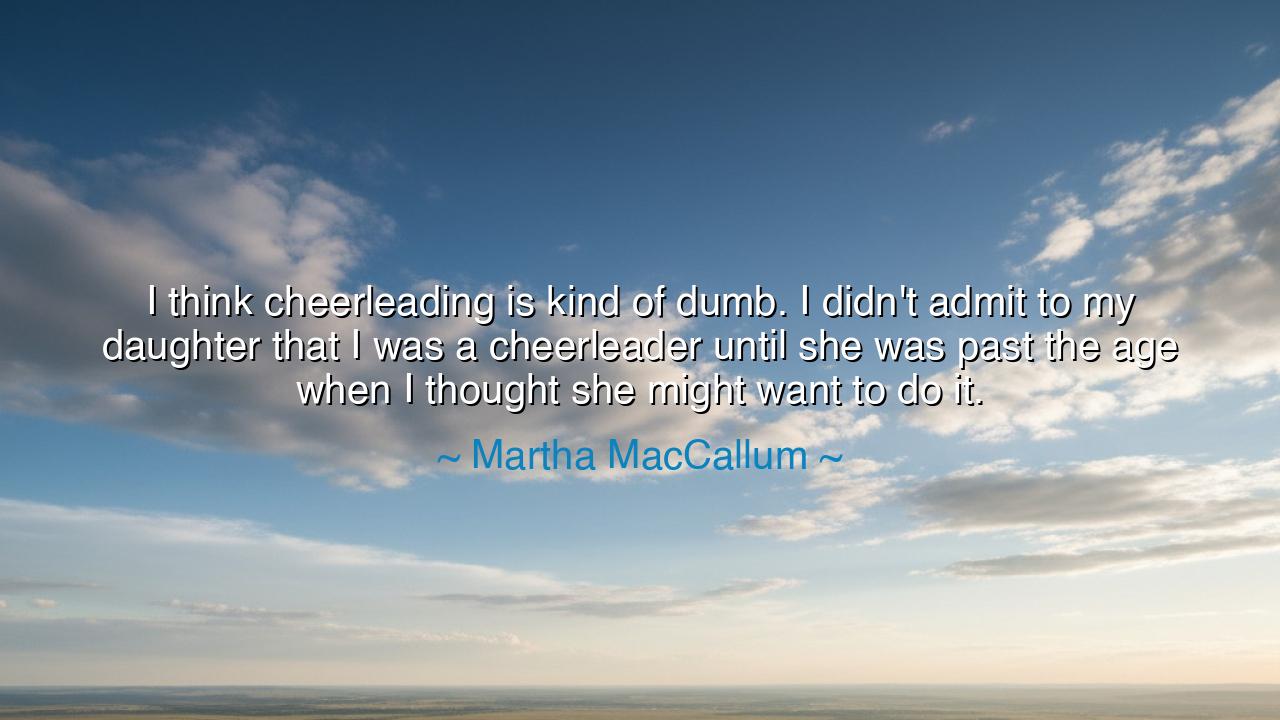
I think cheerleading is kind of dumb. I didn't admit to my
I think cheerleading is kind of dumb. I didn't admit to my daughter that I was a cheerleader until she was past the age when I thought she might want to do it.






"I think cheerleading is kind of dumb. I didn't admit to my daughter that I was a cheerleader until she was past the age when I thought she might want to do it." — Martha MacCallum
In these candid words, Martha MacCallum reveals a profound truth about the complex nature of self-perception and the pressure of societal expectations. She acknowledges that, in her youth, she participated in cheerleading, yet, as a mother, she felt a sense of reluctance to openly embrace this past when it came to her daughter. Her words hint at the incongruence between personal experiences and the judgments we carry about them—how we sometimes view the things we did in the past as embarrassing or insignificant, and how we project those feelings onto our children. There is a subtle tension here, for MacCallum recognizes the value of personal history, yet struggles with the notion of passing down something that, in hindsight, she now considers "dumb".
In ancient times, the act of cheerleading might have been seen through a different lens. The Greeks, for instance, celebrated athleticism and performance in their Olympic Games, where the audience cheered not just as spectators but as part of the communal celebration of human achievement. Cheerleading might have been an expression of communal joy, a way to rally support for the competitors, much like the raucous chants and rhythmic movements of ancient soldiers before going into battle. But as Martha MacCallum points out, the world has changed, and what was once a youthful expression of excitement and energy has been redefined, often reduced to something more superficial. She feels that the pursuit of such expressions, in their modern form, might now lack depth, purpose, or a greater meaning.
This shift in perception is not unique to cheerleading but reflects the broader changes in how we view the activities that define our younger years. Much like the ancient philosophers, who often looked down upon the pleasures of youth as distractions from the true pursuit of wisdom, MacCallum’s discomfort with cheerleading may stem from a deeper concern for what truly matters in life. Socrates, for instance, questioned the value of many activities of his time, urging young people to seek knowledge and cultivate virtue over temporary, physical pursuits. In a world where appearance often takes precedence over substance, MacCallum’s hesitation to embrace cheerleading represents a struggle between youthful exuberance and the call for meaningful living.
Yet, even within this tension, MacCallum's story reflects a broader theme in life—the pressure to conform to certain standards or values, especially as a parent. She did not share her cheerleading past with her daughter out of concern that it might influence her choices in ways she did not deem beneficial. There is a subtle, emotional undercurrent here, for MacCallum’s story speaks to a common human fear: that our past actions, our youthful choices, might be used to shape or even limit the futures of the younger generation. Her own regret in cheerleading, perhaps influenced by a broader societal judgment, led her to question whether it was something to be celebrated or hidden.
The story of Confucius, the great Chinese philosopher, offers a similar reflection on personal choices and the lessons we impart to the next generation. Confucius believed that education and the pursuit of wisdom were the highest endeavors of a person. He placed great emphasis on moral conduct and the improvement of one’s character. In this sense, he would likely see cheerleading, as MacCallum experiences it, as an activity whose value is less about the fun or excitement of the moment and more about whether it contributes to the moral development of an individual. To Confucius, every action, no matter how trivial it might seem, should align with the greater goal of self-cultivation.
The lesson here, then, is not about the right or wrong of cheerleading itself, but about the reflections we make on the choices we’ve made in our lives and how we pass them onto others. Martha MacCallum’s story serves as a cautionary tale about the judgment we place on our own pasts and the pressure to be a certain kind of role model. It teaches us that there is a delicate balance between being open with our past experiences and guiding our children to make choices that align with their values. As parents, teachers, and mentors, we must learn to separate our own discomfort from the opportunities of the next generation.
Thus, the practical actions we can take from MacCallum’s words are clear. First, let us embrace our past, knowing that every experience—whether cheerleading, a difficult decision, or a carefree moment—contributes to the rich tapestry of our lives. Second, let us not impose our judgments upon those who follow. Instead, let us encourage the young to explore, to grow, and to make their own decisions, knowing that their path may be different from ours. Lastly, we must teach the value of reflection, helping others, and ourselves, understand that the choices we make in youth are but stepping stones toward the greater wisdom that comes with age. We are more than the sum of our past actions; we are defined by how we grow, how we learn, and how we choose to impart our wisdom to those who follow.






AAdministratorAdministrator
Welcome, honored guests. Please leave a comment, we will respond soon